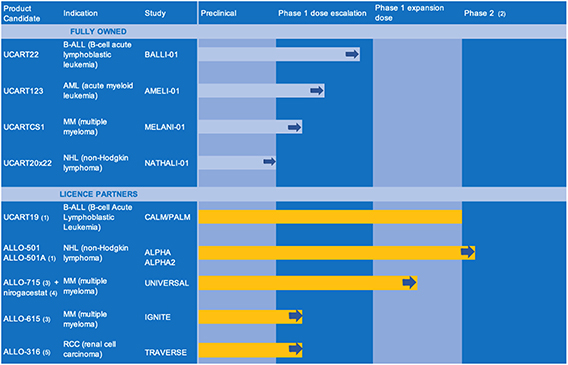This report on Form 6-K, including Exhibit 99.1 (which is incorporated here by reference) but excluding Exhibit 99.2, shall be deemed to be incorporated by reference in the registration statements of Cellectis S.A. on Form F-3 (No. 333-265826) and Form S-8 (Nos. 333-267760, 333-204205, 333-214884, 333-222482, 333-227717 and 333-258514), to the extent not superseded by documents or reports subsequently filed.
Cellectis Announces Positive Preliminary Clinical Data for UCART22 in ALL and UCART123 in AML
On December 13, 2022, Cellectis S.A. (the “Company” or “Cellectis”) issued a press release and conducted a webinar using a related presentation to review updated clinical data on its Phase 1/2a BALLI-01 clinical trial (evaluating UCART22) and on its Phase 1 AMELI-01 clinical trial (evaluating UCART123) that were presented in an oral session on December 12, 2022 at the 64th Annual Meeting of the American Society of Hematology (ASH).
Preliminary Data from the BALLI-01 Clinical Study
BALLI-01 is a Phase 1/2a open-label dose-escalation trial evaluating the safety and clinical activity of UCART22 given at escalating dose levels after lymphodepletion (LD) with either fludarabine and cyclophosphamide (FC) or FC with alemtuzumab (FCA) in patients with relapsed or refractory acute lymphoblastic leukemia (r/r ALL). Alemtuzumab was added to the LD regimen to sustain host T-cell and Natural Killer (NK) cell depletion and to promote UCART22 cell expansion and persistence.
Compared to the last clinical update on BALLI-01 at ASH 2021, the Company is presenting data from five additional patients who received UCART22 at dose level 3 (DL3) 5x106 cells/kg after lymphodepletion with FCA. No dose limiting toxicities (DLTs), Grade 2 or higher cytokine release syndrome (CRS), immune effector cell-associated neurotoxicity syndrome (ICANS) or adverse events of special interest (AESI) were observed.
Evidence of UCART22 anti-tumor activity was observed in 60% (n=3) of the five patients at DL3 after lymphodepletion with FCA:
| | • | | A patient experienced a durable minimal residual disease (MRD) negative complete response with incomplete count recovery (CRi) that continues beyond 6 months. |
| | • | | A patient experienced an MRD negative complete response (CR) that continues beyond Day 56. |
| | • | | A patient experienced a morphologic leukemia-free state (MLFS) that continues beyond Day 84 (MRD-negative until Day 84; MRD-positive at Day 117). |
All three of the responders failed multiple lines of prior therapy, including chemotherapy, CD19-directed autologous CAR T cell therapy, and allogeneic stem cell transplant. Additionally, the patient with the MRD negative CR also failed both prior blinatumomab (a CD19-directed bi-specific antibody) and inotuzumab (a CD22-directed antibody-drug conjugate).
Next Steps
Overall, these preliminary data support the continued administration of UCART22 after FCA lymphodepletion in patients with r/r ALL. The Company is now enrolling patients in BALLI-01 with product candidate manufactured fully in-house at DL2 after FCA lymphodepletion. The first patient has been dosed at dose level 2 (DL2) 1x106 cells/kg. The next data set is expected to be released in 2023.
Preliminary Clinical Data from the AMELI-01 Study Presented at ASH 2022
AMELI-01 is a Phase 1 open-label dose-escalation trial evaluating the safety, tolerability, expansion and preliminary activity of UCART123 given at escalating dose levels after lymphodepletion (LD) with either fludarabine and cyclophosphamide (FC) or FC with alemtuzumab (FCA) in patients with relapsed or refractory acute myeloid leukemia (r/r AML).
The oral presentation reviewed preliminary data from patients who received UCART123 at one of the following dose levels: dose level 1 (DL1) 2.5x105 cells/kg; dose level 2 (DL2) 6.25x105 cells/kg; intermediate dose level 2 (DL2i) 1.5x106 cells/kg; or dose level 3 (DL3) 3.30x106 cells/kg after lymphodepletion with FC ([n=8], DL1 – DL3) or FCA ([n=9], DL2 & DL2i).
